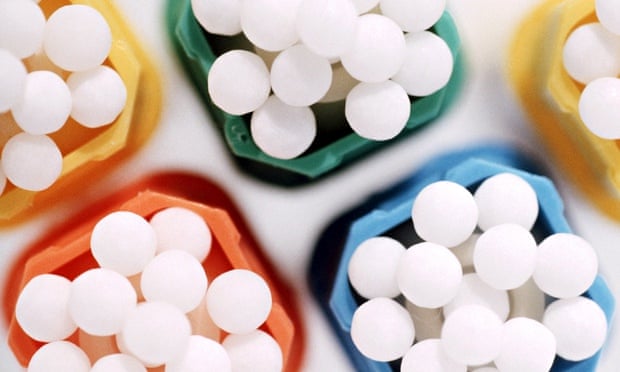Homeopathy not effective for treating any condition, Australian report finds
Report by top medical research body says ‘people who choose homeopathy may put their health at risk if they reject or delay treatments’
 Australia’s National Health and Medical Research Council hopes report will discourage private health insurers from offering rebates on homeopathic treatments. Photograph: Alix/Phanie/Rex Features Photograph: Alix / Phanie / Rex Features/Alix / Phanie / Rex Features
Australia’s National Health and Medical Research Council hopes report will discourage private health insurers from offering rebates on homeopathic treatments. Photograph: Alix/Phanie/Rex Features Photograph: Alix / Phanie / Rex Features/Alix / Phanie / Rex Features
Homeopathy is not effective for treating any health condition, Australia’s top body for medical research has concluded, after undertaking an extensive review of existing studies.
Homeopaths believe that illness-causing substances can, in minute doses, treat people who are unwell.
By diluting these substances in water or alcohol, homeopaths claim the resulting mixture retains a “memory” of the original substance that triggers a healing response in the body.
These claims have been widely disproven by multiple studies, but the National Health and Medical Research Council (NHMRC) has for the first time thoroughly reviewed 225 research papers on homeopathy to come up with its position statement, released on Wednesday.
“Based on the assessment of the evidence of effectiveness of homeopathy, NHMRC concludes that there are no health conditions for which there is reliable evidence that homeopathy is effective,” the report concluded.
“People who choose homeopathy may put their health at risk if they reject or delay treatments for which there is good evidence for safety and effectiveness.”
An independent company also reviewed the studies and appraised the evidence to prevent bias.
Chair of the NHMRC Homeopathy Working Committee, Professor Paul Glasziou, said he hoped the findings would lead private health insurers to stop offering rebates on homeopathic treatments, and force pharmacists to reconsider stocking them.
“There will be a tail of people who won’t respond to this report, and who will say it’s all a conspiracy of the establishment,” Glasziou said.
“But we hope there will be a lot of reasonable people out there who will reconsider selling, using or subsiding these substances.”
While some studies reported homeopathy was effective, the quality of those studies was poor and suffered serious flaws in their design, and did not have enough participants to support the idea that homeopathy worked any better than a sugar pill, the report found.
In making its findings the NHMRC also analysed 57 systematic reviews, a high-quality type of study that assesses all existing, quality research on a particular topic and synthesises it to make a number of strong, overall findings.
Glasziou said homeopathy use declined in the UK following a House of Commons report released in 2010 which found the treatments were ineffective, and that he hoped the NHMRC report would have a similar effect in Australia.
Dr Ken Harvey, a medicinal drug policy expert and health consumer advocate, said private colleges were charging thousands of dollars for courses in homeopathy, and he hoped students would reconsider taking them.
The government’s Tertiary Education Quality Standards Agency (TEQSA) should stop accrediting homeopathic courses, he said, while the private health insurance rebate should be not be offered on any policies covering homeopathy and other unproven treatments.
“I have no problems with private colleges wanting to run courses on crystal-ball gazing, iridology and homeopathy, and if people are crazy enough to pay for it, it’s their decision,” Harvey said.
“But if those courses are approved by a commonwealth body, that’s a different story and a real problem.”
Approved courses are reviewed by TESQA every seven years, with its own guidelines stating the content of a course should be “drawn from a substantial, coherent and current body of knowledge and scholarship in one or more academic disciplines and includes the study of relevant theoretical frameworks and research findings”.
A TESQA spokesperson said independent experts were used to assess whether or not a course complied with its standards. He said homeopathy courses already accredited would not be re-evaluated in light of the NHMRC’s findings, and would only be reviewed when their accreditation was next due for renewal.
In a statement responding to the NHMRC report, the Australian Homeopathic Association (AHA) claimed around a million Australians used homeopathy